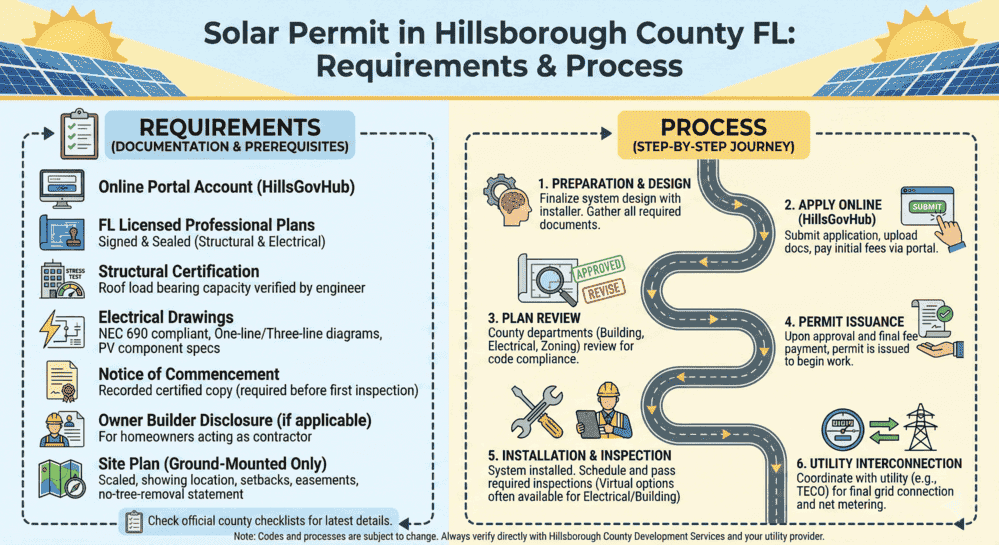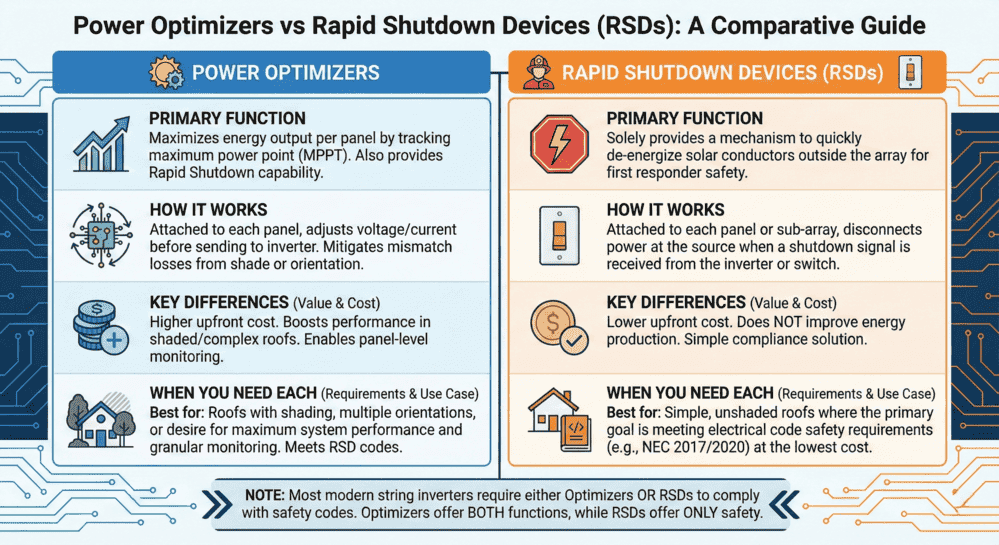Solar permit design costs and approval times can be reduced by researching jurisdiction-specific requirements during early planning stages to identify necessary documentation and fee structures, ensuring accurate submission of site plans, system designs, and electrical diagrams that meet local building and safety codes to eliminate costly revisions, and leveraging professional permit design services with local zoning and electrical regulation expertise to minimize rejection risks.
Permit expenses are determined by geographic location with municipalities setting independent fee structures and administrative costs, system scale where larger commercial installations require more detailed reviews and multiple inspections compared to residential projects, mounting configuration as ground-mounted systems necessitate additional zoning permits and comprehensive engineering stamps beyond rooftop installations, and regulatory complexity including structural engineering reports and electrical assessments mandated by strict local codes. Expediting approval timelines involves utilizing online permitting platforms for faster digital submissions and real-time tracking, maintaining thorough documentation with professional drawings and technical specifications to satisfy inspector requirements, and establishing collaborative relationships with permitting authorities to navigate review processes efficiently.
The permit lifecycle spans initial research and document preparation, submission to local permitting authority with electrical diagrams and structural calculations, review by building and electrical inspectors for code compliance, issuance of permits following approval, rough and final inspections during and after installation, and AHJ final approval enabling grid connection and system commissioning.
The solar permit process can be a frustrating hurdle for homeowners and businesses despite the growing interest in solar power for its environmental and financial benefits. This is why many solar energy installers take on the responsibility of managing the permitting process for their clients. Even with improvements made by local authorities to simplify the process, it still presents significant challenges for contractors.
Therefore, it is essential to find ways to reduce permit costs and streamline the process to maintain profitability for both residential and commercial solar projects.
Permitting delays can stall projects and create a negative impression of solar contractors, even when they aren’t to blame. Such setbacks can complicate scheduling installations and disrupt workflow management.
With over a decade of experience in navigating solar permit requirements across various regions in the United States, we offer strategies to save time and reduce costs, all while maintaining exceptional customer service. Implementing these tips can help you avoid unnecessary delays and enhance the efficiency of your solar installations, ensuring a smooth and profitable process.

What Is a Solar Panel Permit?
A solar design permit is an official authorization issued by local authorities that allows for the installation of solar energy systems on residential or commercial properties. This permit process usually encompasses both building and electrical permits, ensuring that the proposed solar installation complies with all necessary codes and standards. To obtain a permit, detailed plans and specifications of the solar system must be submitted for review by the local building department. In certain cases, the process also involves zoning and structural evaluations to verify that the installation will not affect the property’s safety or compliance with local regulations.
The Importance of Residential Solar Permits
Residential solar permits play a vital role in ensuring the safety and compliance of solar energy installations. These permits are required to verify that the installation adheres to local building and electrical codes, thereby reducing the risk of potential hazards such as electrical faults, structural failures, or fire incidents. By enforcing these regulations, local authorities can help protect both property owners and the surrounding community.
Additionally, solar permits are essential for maintaining high-quality standards in solar installations. They ensure that systems are properly designed and installed, which can significantly improve the performance and lifespan of the solar panels. Adhering to these codes not only enhances safety but also increases the reliability and efficiency of the solar energy system, supporting the broader goal of effective and sustainable renewable energy adoption.
Overview of the Typical Residential Solar Permitting Process
The typicalphotovoltaic (PV) residential solar permit process consists of several key steps:
Pre-Application Research
Homeowners or installers begin by researching the specific solar permitting requirements for their local jurisdiction, as these can vary widely. This step involves gathering information on the necessary documents, understanding the associated solar permit fees, and identifying any local codes or regulations that must be followed.
Solar Permit Application Submission
Once all the required information is gathered, detailed plans and specifications of the proposed solar PV system are prepared and submitted to the local permitting authority. This submission generally includes site plans, electrical diagrams, and structural calculations to demonstrate compliance with building and electrical codes.
Solar Plan Review
After submission, the provided documents undergo a thorough review by building and electrical inspectors. This review ensures that the proposed solar installation adheres to all local codes and standards. If the inspectors identify any discrepancies or issues, revisions will be required, and the documents must be resubmitted for further evaluation.
Solar PV Permit Issued
Once the solar plans meet all regulatory requirements and are approved by the relevant authorities, the PV permits are issued. With these permits in hand, the installation can move forward, following the approved plans to ensure compliance and safety throughout the process.
Solar System Inspections
Throughout and after the installation process, inspections are conducted to ensure that the solar system is installed in accordance with the approved plans and local codes. This may include several inspections, such as a rough inspection before the panels are installed and a final inspection once the system is fully operational. Some jurisdictions may only require a single inspection to confirm compliance, depending on local regulations.
Final Solar Permit Approval
Once the solar system has passed all necessary inspections, the authority having jurisdiction (AHJ) grants final approval. With this approval, the solar system can be officially commissioned and connected to the grid, allowing it to begin generating clean energy for the property.

Factors Impacting Solar Panel Permit Costs
The cost of obtaining permits for solar panel installations can vary significantly based on several key factors:
Solar System Location
The location of the solar installation greatly influences permit costs. Fees can differ widely depending on the city, county, or state where the system is being installed, as local governments establish their own fee structures. Areas with more complex regulatory requirements or higher administrative expenses may charge higher fees. For example, urban locations often have higher solar permit costs compared to rural areas due to increased regulatory oversight and administrative demands.
PV System Size and Type
The size and type of the solar panel system also impact permit costs. Larger systems generally require more detailed reviews and additional inspections, leading to higher permitting fees. Similarly, the nature of the installation—whether it is residential or commercial property, can affect the cost. Commercial solar installations often incur higher fees due to their larger scale and increased complexity, requiring more comprehensive evaluation and compliance checks.
Ground Mount vs. Rooftop Solar
The cost of solar permits can be higher for ground-mounted PV systems compared to rooftop installations. This is because many municipalities require additional zoning permits for ground-mounted systems. Furthermore, the plan sets for these systems are more likely to need comprehensive engineering reviews and stamps, which can increase costs. Additional paperwork may also be necessary to ensure the proposed system adheres to local zoning regulations and structural requirements, further contributing to the overall permit expenses.
Local Regulations and Inspection Requirements
The cost of solar permits is also influenced by the specific regulations and inspection requirements of different municipalities. Some areas mandate multiple inspections throughout the installation process, which can increase the total permit costs. Additionally, strict local codes or additional requirements for structural engineering reports and electrical assessments can drive up expenses, making it crucial to understand and comply with all local regulations to avoid unexpected costs.
Solar Permit Application Complexity
The intricacy of the solar permit application process can significantly impact costs. Applications that require extensive documentation, professional drawings, or detailed technical specifications tend to incur higher fees. This is due to the need for specialized services, such as obtaining solar engineering stamps and conducting professional reviews, to ensure the application meets all necessary standards and requirements.
Expedited Solar Permit Processing Fees
In some cases, you may choose to pay for expedited processing to accelerate the solar permit approval timeline. While this can help speed up the project, it usually comes with an additional fee, which can increase the overall cost of obtaining the solar permit. This option can be particularly useful for projects with tight deadlines, but it’s essential to factor in these extra costs when budgeting for your solar installation.

Strategies to Reduce Solar Permit Costs
While solar permitting expenses can contribute to overall project costs, several strategies can help minimize these expenses while ensuring a smooth permitting process.
Streamline the Solar Permit Application Process
To streamline the solar permit application process, it’s essential for solar companies to begin researching local permit requirements during the early planning stages. By understanding the necessary documentation, such as site plans, system designs, and electrical diagrams, installers can prevent delays and reduce costs. Utilizing online solar permitting systems, where available, can also expedite the application process, saving both time and resources.
Ensure Accurate Documentation & Solar Plan Sets
Accurate and comprehensive documentation is key to a successful and cost-effective permitting process. Solar companies should ensure that all solar drawings and plan sets are meticulously prepared to meet local building and safety codes. This attention to detail helps avoid costly revisions, resubmissions, and project delays. By submitting precise and thorough documentation, companies can facilitate quicker permit approvals and reduce the likelihood of incurring additional expenses during the inspection process.
Utilize a Solar Permit Design Service
Given the complexity of the solar permitting process, using a professional solar permit design service can be an effective way to help contractors meet all necessary requirements. These services specialize in preparing detailed, compliant plans and documentation, significantly reducing the risk of errors and rejections. It is crucial, however, to choose a design service that is well-versed in local zoning, electrical, and building regulations to ensure that all aspects of the permit application are covered. Partnering with a reputable network of experienced solar design and engineering specialists can provide valuable expertise, helping streamline the permitting process and enhancing project efficiency.

Solar Permit Solutions
Skip the Permit Headaches
We design plan sets that pass inspection the first time. Code-compliant, PE-stamped, accepted by AHJs nationwide.
Best Practices for AHJs in Reducing Solar Panel Permitting Costs
Municipalities looking to promote the adoption of renewable energy can significantly enhance the solar permitting process by implementing the following best practices:
Implementing Online Solar Permitting Systems
- Online Permit Application Portals: Developing online portals for permit applications enables municipalities to streamline the submission process. Applicants can submit all required documentation digitally, reducing the need for physical paperwork and allowing for faster and more efficient permit processing. Additionally, online portals provide an accessible way for applicants to track the status of their applications, improving transparency and communication throughout the process.
- Automated Reviews: By integrating automated review systems, municipalities can quickly identify and flag common issues within applications. These systems ensure that applications meet basic requirements before being reviewed by human staff, thus speeding up the overall process. Automated reviews can significantly reduce errors and minimize the need for resubmissions, leading to faster permit approvals and increased efficiency.
Standardizing Solar Permit Requirements
- Unified Permit Guidelines: Creating standardized guidelines for solar permits, particularly for small-scale residential projects, can simplify the process for applicants and reviewers alike. Providing clear checklists and templates ensures that all necessary information is included, reducing confusion and improving the quality and consistency of applications. This approach helps applicants understand what is required upfront, minimizing delays caused by missing or incorrect information.
- Adopting Best Practice Models: Municipalities can adopt proven models such as SolarAPP+ (Solar Automated Permit Processing), developed by the U.S. Department of Energy, to further standardize and automate the permit review process for residential solar installations. By implementing these best practices, jurisdictions can streamline their processes, reduce review times, and lower the administrative burden on both applicants and permitting staff, ultimately promoting faster adoption of solar energy systems.
Reducing Solar Permit Fees and Expediting Processes
- Fee Waivers or Reductions: To promote the adoption of renewable energy, municipalities can consider reducing or waiving solar permit fees, especially for residential PV installations and low-income households. This incentive can lower the financial barrier for homeowners and encourage wider participation in solar energy adoption.
- Expedited Solar Permit Review Processes: Establishing expedited review processes for standard residential installations can significantly shorten approval times. By setting specific criteria—such as system size and complexity—that, if met, qualify for faster processing, municipalities can streamline the permitting process without compromising safety or compliance.
Training and Resources for Staff
- Specialized Training: Providing staff with specialized training on photovoltaic (PV) technology and common installation practices equips them to review applications more accurately and efficiently. Knowledgeable staff can identify and address potential issues quickly, reducing the likelihood of delays and errors in the permit approval process.
- Dedicated Solar Permitting Teams: Forming dedicated teams that focus solely on processing solar permits ensures that these applications are handled by experienced personnel who are familiar with the nuances of solar installations. This specialized approach can lead to faster, more consistent, and accurate permit reviews.
Enhancing Communication and Support
- Clear Communication Channels: Establishing direct and transparent communication between the solar permitting office and applicants is crucial for addressing questions and concerns promptly. Providing comprehensive guides, step-by-step instructions, and a detailed FAQ section on the municipality’s website can help applicants understand the permitting process and avoid common pitfalls.
- Solar Permitting Support Services: Offering dedicated customer support for solar permit applicants can significantly reduce delays caused by misunderstandings or incomplete applications. A support team that can answer questions and provide guidance throughout the process helps ensure that applications are complete and compliant, leading to quicker approvals and increased satisfaction for both applicants and permitting staff.
Collaboration and Partnerships
- Inter-Agency Coordination: Effective collaboration between various municipal departments, such as building, electrical, and zoning, is essential for streamlining the solar permitting process. By establishing clear communication channels and coordinated workflows, jurisdictions can minimize delays and ensure a more cohesive and efficient review process. This collaborative approach helps in reducing redundancy and addressing cross-departmental issues more effectively.
- Partnerships with Industry: Engaging with local solar industry stakeholders, such as installers, engineers, and manufacturers, provides valuable insights into the practical challenges they face during the permitting process. Regular meetings and feedback sessions can help municipalities identify bottlenecks, gather suggestions for improvement, and implement changes that make the process more user-friendly. These partnerships can also foster a collaborative environment where both authorities and industry professionals work together to promote the growth of solar energy adoption in the community.
Streamlining Your Solar Permit Process Cuts Costs
Reducing solar permitting costs is crucial for making solar energy more affordable and accessible to clients. By implementing strategies such as streamlining the application process, thorough planning, and maintaining accurate documentation, you can significantly minimize delays and avoid additional expenses.
Staying informed about local regulations and building positive relationships with permitting authorities allows for more efficient navigation through the complexities of the permitting process. This proactive approach not only accelerates project timelines, benefiting your business, but also improves customer satisfaction by ensuring that installations are completed smoothly and without unnecessary obstacles.
Conclusion
Reducing solar permit design costs and approval times is essential for the widespread adoption of solar energy. By streamlining the application process, ensuring accurate documentation, and using professional design services, contractors can minimize delays and expenses. Staying informed about local regulations and collaborating with permitting authorities will help navigate the complexities of the process more effectively. This proactive approach not only accelerates project timelines and reduces costs but also enhances customer satisfaction by ensuring smooth and efficient solar installations.
FAQs
Skip the Permit Headaches
We design plan sets that pass inspection the first time. Code-compliant, PE-stamped, accepted by AHJs nationwide.
Frequently Asked Questions
Solar permit costs vary significantly based on location, system size, and installation type. Residential solar permits typically range from $200 to $2,000, while commercial installations can cost $1,000 to $10,000 or more depending on system complexity. According to the National Renewable Energy Laboratory, permit fees represent a portion of total soft costs in solar installations. Urban jurisdictions generally charge higher fees than rural areas due to increased administrative oversight, and ground-mounted systems often incur additional zoning permit expenses compared to rooftop installations. Factors such as expedited processing, multiple inspection requirements, and engineering stamp needs can further increase total permitting costs.
The solar permit approval timeline varies by jurisdiction and project complexity. Simple residential rooftop installations in streamlined jurisdictions may receive approval within 1-3 weeks, while more complex commercial projects can take 6-12 weeks or longer. The U.S. Department of Energy notes that permit approval times are improving as more municipalities adopt online systems and standardized processes. Factors affecting timeline include completeness of submitted documentation, local building department workload, requirement for multiple inspections, and whether revisions are needed. Some jurisdictions offer expedited processing for an additional fee, potentially reducing approval times by 50% or more.
A comprehensive solar permit application requires site plans showing property boundaries and solar array placement, detailed electrical diagrams including single-line drawings and interconnection schematics, structural calculations demonstrating roof load capacity or ground-mount foundation requirements, equipment specifications for panels, inverters, and mounting systems, and proof of compliance with National Electrical Code Article 690. Additional documentation may include engineering stamps from licensed professionals, zoning approval for ground-mounted systems, utility interconnection agreements, and property surveys. According to SEIA (Solar Energy Industries Association), providing complete and accurate documentation upfront significantly reduces revision requests and accelerates approval timelines.
While property owners can technically apply for solar permits themselves, using professional permit design services or licensed contractors is highly recommended due to the technical complexity and regulatory requirements involved. DIY permit applications often face rejections due to incomplete documentation, code compliance errors, or missing engineering calculations. Professional services understand local jurisdiction requirements, maintain relationships with permitting authorities, and ensure submissions meet all safety and building codes. The Interstate Renewable Energy Council emphasizes that proper permit design requires knowledge of electrical systems, structural engineering, and local building codes, making professional assistance valuable for avoiding costly delays and ensuring installation safety.
Common rejection reasons include incomplete or inaccurate documentation such as missing electrical diagrams or insufficient structural calculations, non-compliance with local zoning ordinances or setback requirements, failure to demonstrate adequate roof load capacity for panel weight, improper grounding or electrical connection specifications violating code standards, and missing required engineering stamps or professional certifications. Other issues include inadequate fire safety clearances, incorrect equipment specifications that don't match local requirements, missing utility interconnection agreements, and failure to address shading or aesthetic concerns in certain jurisdictions. Ensuring thorough documentation review before submission and consulting with professional permit designers familiar with local codes can significantly reduce rejection rates and accelerate approval timelines.
SPS Editorial Team
Solar Permit Solutions
Solar Permit Solutions provides professional solar permit design services for residential, commercial, and off-grid installations across all 50 states. Our team ensures permit-ready plan sets delivered fast.
Related Articles

Solar Permit in Hillsborough County FL: Requirements & Process
Hillsborough County solar permits require either an Electrical Trade permit for ...

Power Optimizers vs Rapid Shutdown Devices: Differences, Requirements & When You Need Each
When planning a solar installation, understanding the difference between rapid s...

Your Complete DIY Solar Panel Installation Guide
Homeowners turn to solar energy for various motivations. Clean, renewable power ...
